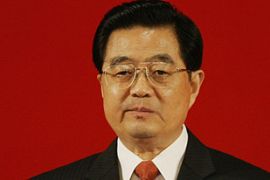China’s Hu remains an enigma
The Chinese leader departs from his predecessor’s path towards development.

Published On 15 Oct 2007
But those who have seen Hu operate – in the faction-ridden, murky world of Chinese politics – argue that beneath the deadpan veneer lurks a keen political mind.
When he took power after the Communist party’s 16th congress in 2003, Hu found himself facing a government machinery stacked with Jiang allies.
Clear message
The message was clear: the “old man” may have retired, but he intended to keep a close watch over the new leader’s shoulders.
Some observers speculated that Hu might be little more than a figurehead.
| China Congress |
|
|
Instead, five years after taking power, Hu has increasingly struck his own course.
Rather than Jiang’s emphasis on breakneck economic development, Hu has instead sought to champion the hundreds of millions who have yet to taste the fruits of China’s economic boom.
It is a stance that forms the core of Hu’s agenda to build what he calls a “harmonious society”, using a concept he labels “scientific development” – emphasising social stability and economic sustainability.
Those who portray Hu as a compassionate conservative say this stems from his many years working in party posts in some of China’s poorest provinces.
It is this no-nonsense, man-of-the-people aura that the Hu public relations machine has been keen to cultivate.
According to one report, for example, he recently spent just $4 on two days of meals during an official trip.
Pragmatism
But it could also be argued that, on a more pragmatic level, ensuring a content, “harmonious society” is the only realistic way the Communist party can retain its hold on power.
Having all but abandoned their socialist dogma, China’s leaders now stake their legitimacy on continuing to deliver growth.
At the same time though, Hu has made it clear that he is no pushover.
Under his leadership, scores of journalists, lawyers and human rights campaigners have been jailed – emphasising that, on his watch, there will be no loosing of the Communist party’s grip on power.
Now leading the party into its 17th congress – a key political event in the Chinese calendar – Hu is expected to use the occasion to further consolidate his hold on the party and, as a result, on China itself.
It will also see Hu’s ideology of “scientific development” formally added to the constitution – establishing his legitimacy as China’s top leader, emerging from Jiang’s shadow and clearing the way for his own political programme.
Source: Al Jazeera
